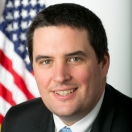
Update: The AP has a preview of Friday’s event: The $787 billion economic stimulus bill Obama signed last week includes billions to help create such jobs as installing solar panels and building wind turbines, which also is part of his goal to nudge the country away from dependence on foreign oil and toward reliance on renewable forms of energy.
It is Obama's belief that such jobs will help raise living standards for middle-class families, who didn't fare well before the current economic downturn set in and are now feeling pinched along with millions of other people who have lost their jobs and homes, and watched retirement and college savings disappear."
…..
Jared Bernstein, the task force's executive director, said middle-class incomes have fallen by about $2,000 in real terms since the start of the decade and that violates a basic American tenet: that you'll get ahead if you work hard and your children will fare even better.
"Part of this election was about recognizing that a key part of any effective government's economic agenda had to be reconnecting the living standards of the middle class to that of the expanding economy once it starts expanding again," said Bernstein — Biden's chief economist and economic policy adviser.
As Vice President Joe Biden often says, let's roll up our sleeves.
Vice President Biden and the rest of the Middle Class Task Force get down to (official) business for the first time Friday, Feb. 27, at the University of Pennsylvania in Philadelphia.
On the agenda: jobs. Green jobs. Lots of 'em.
Half the cabinet will be there, along with top domestic policy aide Melody Barnes, top environmental policy aide Carol Browner, and Pennsylvania's Gov. Rendell, Sens. Specter and Casey, and Reps. Chaka Fattah and Robert Brady.
But what are green jobs? Where are they? And how do you get one?
Beyond the political heavy-hitters, a lot of clean energy leaders -- including prominent voices from the worlds of policy, non-profits, local government, labor, and business -- will be on hand to try to answer those questions, and these:
--How can we change Washington to make green jobs a political reality? (John Podesta, President and CEO, Center for American Progress)
--How can we ensure access to green jobs to everyone? (Van Jones, founding President, Green for All)
--How do we connect people who need jobs to companies that need people? (Fred Krupp, President, the Environmental Defense Fund)
--How can the federal government help bring green jobs to the middle class? (Carol Browner, Assistant to President Obama for Energy and Climate Change)
--What's the role of the labor movement in creating green jobs and training workers for them? (Leo Gerard, International President of the Steelworkers of America
--How do you create green jobs in a city? (Michael Nutter, Mayor of Philadelphia)
--How can public-private partnerships help train people for green jobs? (Cecilia Estolano, CEO of the Los Angeles Community Redevelopment Authority)
--What's the role for business? (Mark Edlen, President, Gerding-Edlen)
We'll have much more from the MCTF's first meeting later in the week.


